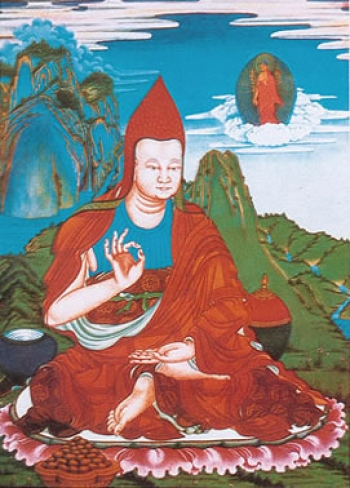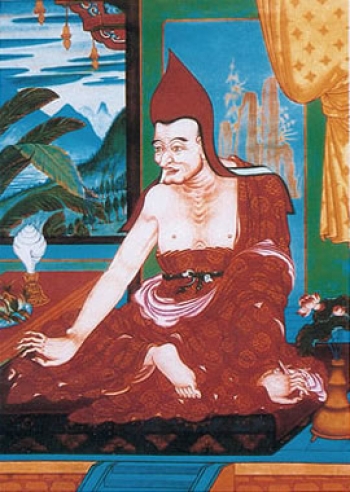This article develops on some of the points made in my previous discussion on Yogacara Buddhism’s philosophy of language. Last week I explained that in Yogacara Buddhist philosophy, words are considered to be connected to their referent through exclusion or differentiation. They are not considered to be connected to their referent due to some positive causal connection. While I know this all sounds rather complex, let me make things clear with an example!
Let us consider the example of the colour turquoise (a bluey greenish colour). Some people may argue that the colour turquoise has some special characteristics which mean that it needs the separate name “turquoise”. However, many other languages do not have any name for the bluey greenish colour known as “turquoise” in English. If this colour was a discreet entity that positively demanded a label, wouldn’t all languages have a name for it? Yogacara Buddhism and modern linguistics both would state that the colour “turquoise” doesn’t actually exist. It is merely created by the acknowledgement that it isn’t “blue” or “green” and has no independent existence in itself. In this way, all words and concepts are created by the exclusion of prior knowledge. Language is based on differentiation and not positive labelling.
I can imagine that you might be sceptical about this view of language. However, I think we can all agree that some level of differentiation is present in the development of language. For instance, when we say “this tree is an Oak tree”, we also mean “this tree is not a tree which is not an Oak tree”. Otherwise, if the word does not exclude other possibilities it would be possible that “this tree is an Oak tree AND an Elm tree” simultaneously. The fact that language is inherently based on differentiation means that we do not understand the statement “this is an Oak tree” in this manner.
However, both Buddhism and some strands of modern linguistics have a problem in dealing with language acquisition. As mentioned, both schools admit that creating new words and concepts requires differentiation from previous knowledge. For instance, to say “this is an Oak tree” we must also have had an experience of something to differentiate the Oak tree from. However, how does a baby learn new words and concepts without prior experiences to differentiate them? Is there some form of “original differentiation”? Does a baby begin differentiating between ‘I’ and ‘non- I’? Yet knowing ‘non-I’ would mean an innate knowledge of ‘I’? How can the concept ‘I’ be acquired without another concept to differentiate it? Or is the original concept acquired through positive affirmation ‘I am’ and not through any form of differentiation?
Modern linguistics still struggles to resolve this issue. As it admits that a word is connected to the object it refers to through differentiation and not through a positive causal connection, it must mean that for humans to acquire words we must already have concepts in our minds before we begin the process of acquiring language. We could go further and say that for every moment of conceptualising consciousness there has to be a prior moment of consciousness to differentiate from. Therefore, our consciousness must be characterised by a beginningless habitual differentiation latent in the human mind. According to this logic, it is impossible to posit a “first” moment of consciousness in a baby if we are to explain how it can form concepts and develop language. It must be born with a conceptualising consciousness and if it is aware of this conceptualising consciousness it must have had a prior moment of consciousness to differentiate from. If it has just been born, it must mean that it had consciousness before birth. In short, if we accept that differentiation plays any part in how our mind conceptualises the world and uses language, the existence of rebirth is a logical result of our analysis.
Since the notion of rebirth is not so familiar in Western academia, the use of rebirth to explain this problematic position is not readily available. Instead, some strands of psychology and modern linguistics state that, despite the fact language is based on differentiation, the first concept acquired by a baby is a positive assertion “I AM”. Words are then acquired by differentiation from this initial concept of “I AM”. However, in explaining language acquisition, linguistics has again relied on the existence of a positive causal connection between an object and a word, a philosophy it had completely rejected previously. Yogacara Buddhism on the other hand maintains the logic of its position by positing that a baby has had previous conscious moments in other lives.
















